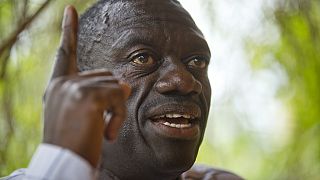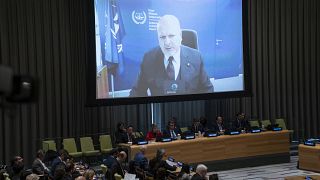Kenya
A ride-hailing company in Kenya is trying to improve the lives of disabled people by providing them with safe and reliable transport.
The Ace Mobility start-up was co-founded over three years ago by Daniel Gatura, now 27, who had witnessed the transport challenges faced by his wheelchair-bound father.
He was just seven years old when his dad sustained a spinal cord injury in an accident that left him in a wheelchair.
This led to him losing his job which added to the challenges faced by the family.
The situation later inspired Daniel to find a mobility solution that would cater to the needs of people with disabilities.
Wheelchair user, Caroline Mwikali, uses the Ace Mobility service to help her get around. She says public transport is not adapted to the needs of people with disabilities.
“What happens, because it is regular seats and your wheelchair cannot fit inside, they even have stairs so someone has to lift you and put you in the chairs. I mean, none of us wants to be lifted publicly like that," she says
Disabled people feel they are discriminated against, and Gatura says it is important to change the narrative around disability and reduced mobility.
“Just because you have a disability doesn't mean you cannot earn for yourself, it doesn't mean you are a nobody in the society,” he says.
“We are using transport to make sure that people with disabilities and reduced mobility gain access to education, gain access to employment opportunities.”
While Kenya’s legal framework promotes inclusivity of people with disabilities, including access to public transport, in practice these laws often remain unenforced.
Sandra Nyawira is the Disability Inclusion Advisor at United Disabled Persons of Kenya which campaigns for disability rights on transport policy.
She says the policies do not “speak to people with disabilities” despite the visible challenges they face when interacting with public spaces and public transport.
“So, it's all about the intentionality of having the disability issues captured in these policies and then being intentional about implementation of those actions," she says.
The United Nations Population Fund says people with disabilities make up 2.2 per cent of Kenya's population, close to one million individuals.
The most common type of disability is mobility-related, accounting for 42 per cent of cases.
For disabled people travelling around Nairobi, services like Ace Mobility are a step in the right direction towards making their lives easier.













01:10
South African beauty queen withdraws from Miss Universe pageant
02:34
Initiative in Nairobi's Mukuru slums uses fly lavae to tackle food waste
01:38
Drones beat logistical challenges to delivery of medical supplies in Kenya
01:43
Democrats in Kenya fear what the next four years will hold, after Trump's U.S. election win
01:02
Kenya, China hold bilateral talks in Nairobi, as Kenya requests China's support to join BRICS
01:24
Haiti's crisis: a focus on security fragility and humanitarian needs